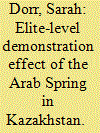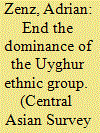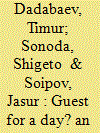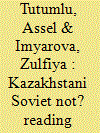|
|
|
Sort Order |
|
|
|
Items / Page
|
|
|
|
|
|
|
| Srl | Item |
| 1 |
ID:
180666


|
|
|
|
|
| Summary/Abstract |
Tajik National Park struggles with overgrazing, illegal hunting and ill-managed tourism. The designation of the park as a UNESCO World Heritage Site in 2013 was meant to ease some of these struggles, but improvements are thus far difficult to identify. We conducted a case study to understand how local people perceive and interact with the park to probe how these struggles could be mitigated. Interviewees and participants proposed solutions that revolved around the concept of co-management, which we consider as a way to alleviate challenges the park faces today, especially in terms of nature conservation and livelihoods for communities affected by the park. We conclude that engaged community members are willing to help the park improve its management by co-producing knowledge and adapting to social–ecological change if certain conditions, such as improving trust and making trade-offs, are met.
|
|
|
|
|
|
|
|
|
|
|
|
|
|
|
|
| 2 |
ID:
180661


|
|
|
|
|
| Summary/Abstract |
What impact has the ‘Arab Spring’ had upon Kazakhstan's approach to regime security? Short of the possibility of a ‘Central Asian Spring’, if and how the Arab Spring reshaped this authoritarian regime has not been addressed. A longitudinal narrative analysis of Kazakhstan's presidential rhetoric from 2005 to 2015 and fieldwork interviews indicated that the Arab Spring uprisings brought about an elite-level demonstration effect. That is, the regime perceived a heightened threat to its security as a result of instability and regime responses elsewhere, and it sought to shore-up its position and forestall the emergence of local challenges as a consequence of this, whether through discourse, behaviour or policy. This suggests that uprisings elsewhere, including those outside of a state's immediate region, can affect perceptions of regime security in the medium term, despite the absence of domestic unrest at home and a lack of close social and cultural ties between regions.
|
|
|
|
|
|
|
|
|
|
|
|
|
|
|
|
| 3 |
ID:
180659


|
|
|
|
|
| Summary/Abstract |
Chinese academics and politicians argue that Xinjiang’s ‘terrorism’ problem can only be solved by ‘optimizing’ its ethnic population structure. High ethnic minority population concentrations are considered a national security threat. ‘Optimizing’ such concentrations requires ‘embedding’ substantial Han populations, whose ‘positive culture’ can mitigate the Uyghur ‘human problem’. Scenarios that do not overburden the region’s ecological carrying capacity entail drastic reductions in ethnic minority natural population growth, potentially decreasing their populations. Population ‘optimization’ discourses and related policies provide a basis to assess Beijing’s ‘intent’ to destroy an ethnic minority population in part through birth prevention per the 1948 United Nations Genocide Convention. The ‘destruction in part’ can be assessed as the difference between projected natural population growth without substantial government interference and reduced growth scenarios in line with population ‘optimization’ requirements. Based on population projections by Chinese researchers, this difference could range between 2.6 and 4.5 million lives by 2040.
|
|
|
|
|
|
|
|
|
|
|
|
|
|
|
|
| 4 |
ID:
180667


|
|
|
|
|
| Summary/Abstract |
By elaborating on the findings of two data sets collected in both Uzbekistan and Japan, this paper demonstrates that Japan has increasingly become a new frontier for Uzbek youngsters who use educational opportunities to seek temporary employment. This attitude of Uzbek students in Japan, which relates to their predisposition towards ‘work’ rather than ‘study’, can be explained by several factors. One set of explanations relates to their commitment to link their future with a home country due to the expectations of their families and communities. Another, at least partially, relates to the ambiguous and unsettled image of the role of Japan for their future, which might be contributing to their study–work imbalance.
|
|
|
|
|
|
|
|
|
|
|
|
|
|
|
|
| 5 |
ID:
180665


|
|
|
|
|
| Summary/Abstract |
Rather than interpreting President Nursultan Nazarbayev’s nation-building model of Kazakhstani-ness as a balance between civic and ethnic forms of nation-building, we show that Kazakhstani-ness was styled on Leonid Brezhnev’s supranational modern identity of the Soviet People. We explore three similarities by comparing rulers’ discursive aspirational statements (rather than historical policy trajectories) in a single case study of Kazakhstan. Both discursive models were based on teleological supranational state ideology, both were depicted as modern and advanced, and both modelled the new identity on the language and culture of ethnic majority. We used thematic discourse analysis in over 50 government documents and speeches of leaders to illustrate our argument. This case presents bigger lessons for regime’s power of defining the national membership in post-Soviet Kazakhstan and beyond.
|
|
|
|
|
|
|
|
|
|
|
|
|
|
|
|
| 6 |
ID:
180663


|
|
|
|
|
| Summary/Abstract |
In post-Soviet Central Asia, Jewish educational frameworks were shaped by unique forces introduced by various Jewish organizations. This article describes and explains the unique formation of Jewish education in post-Soviet Central Asian republics, how it was revived and which organizations shaped it. The article presents and analyses various educational initiatives introduced by Jewish organizations and educational frameworks: formal and informal, local and foreign, state and privately sponsored, religious and civic–national. It claims that all were unique.
|
|
|
|
|
|
|
|
|
|
|
|
|
|
|
|
| 7 |
ID:
180660


|
|
|
|
|
| Summary/Abstract |
This article recounts the identity change that the Sart Kalmaks in Kyrgyzstan have been undergoing since their arrival in the Issyk-Kul region in the second half of the nineteenth century. Historically related to the Russian Kalmyks on the Volga and other Oirat groups in China and Outer Mongolia, the Sart Kalmaks today see themselves as a part of the Kyrgyz nation.
|
|
|
|
|
|
|
|
|
|
|
|
|
|
|
|
| 8 |
ID:
180664


|
|
|
|
|
| Summary/Abstract |
The democratization of higher education (HE) has been interpreted from various perspectives in many country-specific case studies. Yet, it has been overlooked that in authoritarian regimes the democratization of HE may involve the development of freedom of expression, an element taken for granted in democratic societies. Growing research on the implications of COVID-19 on HE fails to cover the emergence of democratization of HE in the form of freedom of expression practiced by university students. This research examines post-Soviet Uzbekistan to analyse how the practising of freedom of expression emerged among the student body during the pandemic era in the country and how the Uzbek government responded to and resolved the matter. Based on this case, it is argued that in authoritarian states the HE democratization framework can include the development of freedom of expression in the form of student protests that, in this article’s case, emerge as concomitant to the pandemic.
|
|
|
|
|
|
|
|
|
|
|
|
|
|
|
|
| 9 |
ID:
180662


|
|
|
|
|
| Summary/Abstract |
Researchers working in Central Asia often report difficulty obtaining Western-style signed informed consent statements. The principles underlying informed consent were developed in cultures characterized by low-power distance and individualism, low context communication and a rules basis, whereas many Central Asian cultures emphasize high-power distance, collectivism, high-context communication and relationships. Yet, consent is an important principle. We interviewed scholars who grew up in Central Asia, but completed graduate work in the United States, Canada or the UK, to ask their recommendations for developing a culturally appropriate consent process. The common themes that arose include working within a network, building relationships of trust with potential participants and not utilizing legal-type documentation as a basis for consent.
|
|
|
|
|
|
|
|
|
|
|
|
|
|
|
|
|
|
|
|
|